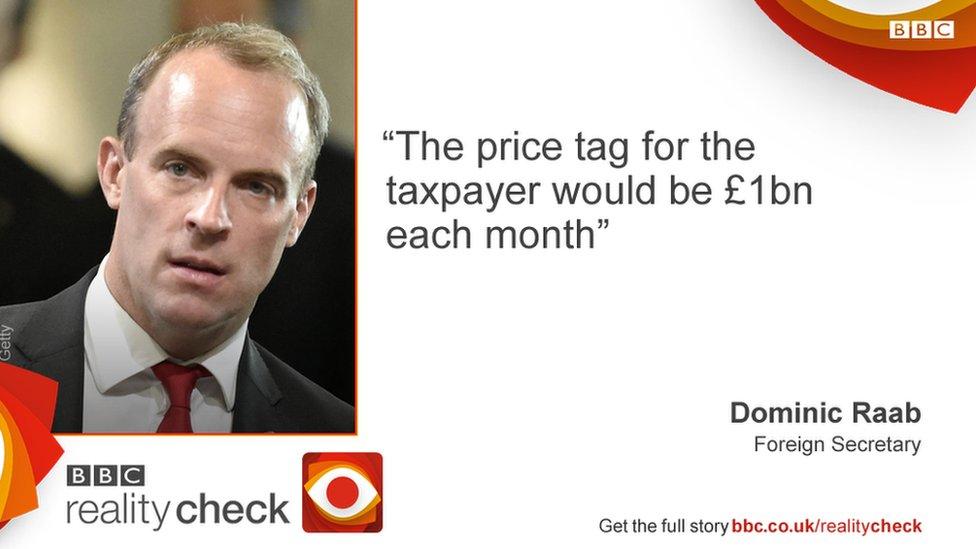Would Brexit extension cost taxpayers £1bn a month?
- Published

The claim: Delaying Brexit would cost the UK £1bn a month in payments to the EU budget.
Reality Check verdict: Mr Raab is right that staying in the EU would cost £1bn a month in budget payments. But his figure excludes any money the government gets back from the EU in grants for things like regional development or supporting farmers. When you factor these in, the figure comes down to about £744m a month.

Foreign Secretary Dominic Raab spoke to the BBC on Tuesday about the attempts by Members of Parliament to pass a bill to prevent a no-deal Brexit.
The bill would try to force the government to seek an extension to Brexit (scheduled to happen on 31 October 2019) until 31 January 2020.
Mr Raab said that would cost taxpayers £1bn per month.
He's right that if Brexit were delayed and the UK continued to be a member of the European Union (EU) it would carry on paying into the EU budget.
How much does the UK pay to the EU?
According to the UK Treasury's, external latest figures, in 2018 the UK's gross contribution to the EU budget was £17.4bn.
However, the UK did not transfer this amount to the EU because before any money is sent to Brussels, the UK rebate is deducted first.
The rebate is the UK's discount on its contributions to the EU, negotiated by Margaret Thatcher in 1984.
The rebate in 2018 was £4.2bn, so the UK actually paid £13.2bn into the EU budget.
The Treasury then received £4.3bn from the EU, for payments to farmers, development and other projects (money allocated by the EU and distributed by the UK government).
When you factor this in it brings the UK's net contribution to £8.9bn, or £744m a month.
The EU also makes some payments directly to the private sector in the UK, to fund research for example. These payments do not appear in the Treasury's accounts, but the Treasury estimated that in 2016 these payments were around £2.3bn, or £192m a month.
The divorce payment
Staying in the EU beyond 31 October and continuing to make payments would also have an impact on any Brexit "divorce payment" the UK agrees to make to the EU.
Theresa May agreed to settle the UK's financial obligations to the EU as part of her Withdrawal Agreement.
This was originally calculated at about £39bn, much of which covered the UK's contributions to the EU Budget up to the end of the planned transition period at the end of 2020.
The Office for Budget Responsibility said as a result of the delay to the Brexit date from the original 29 March to 31 October, the current bill would be about £33bn because the UK's continuing membership of the EU means that some of those payments have been made as normal budget contributions instead of as part of the divorce payment.
If Brexit were to be delayed further, the payments that Mr Raab referred to would further reduce this bill.


